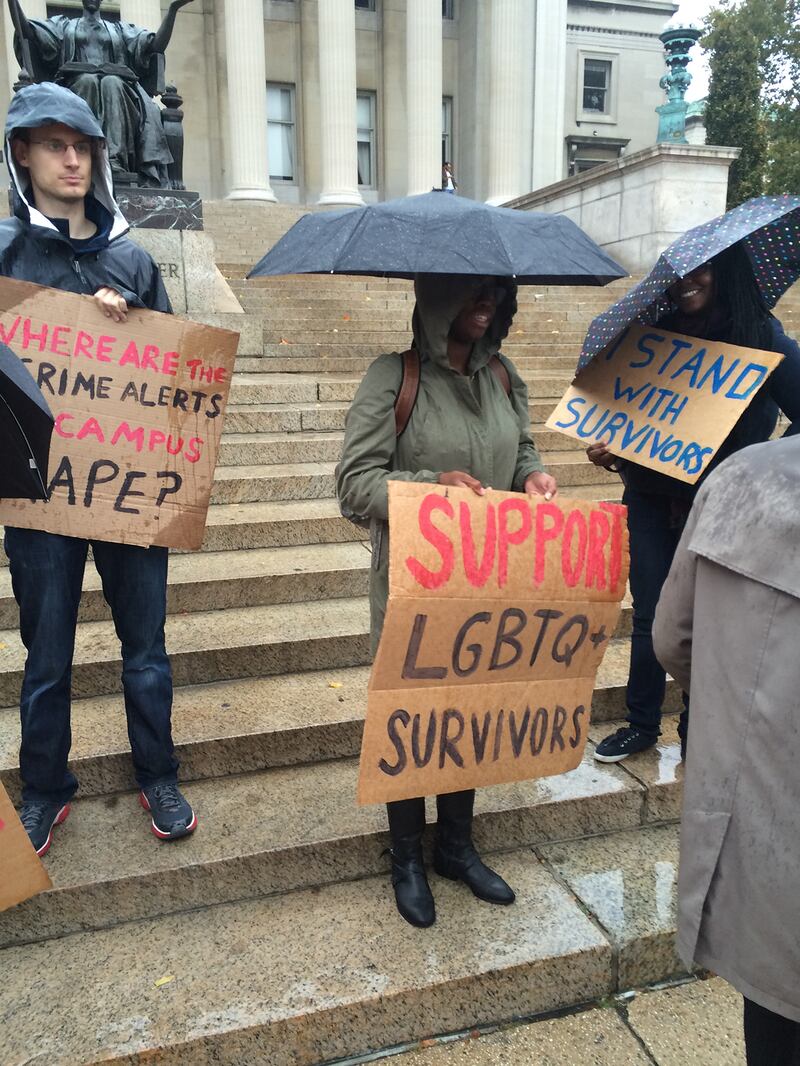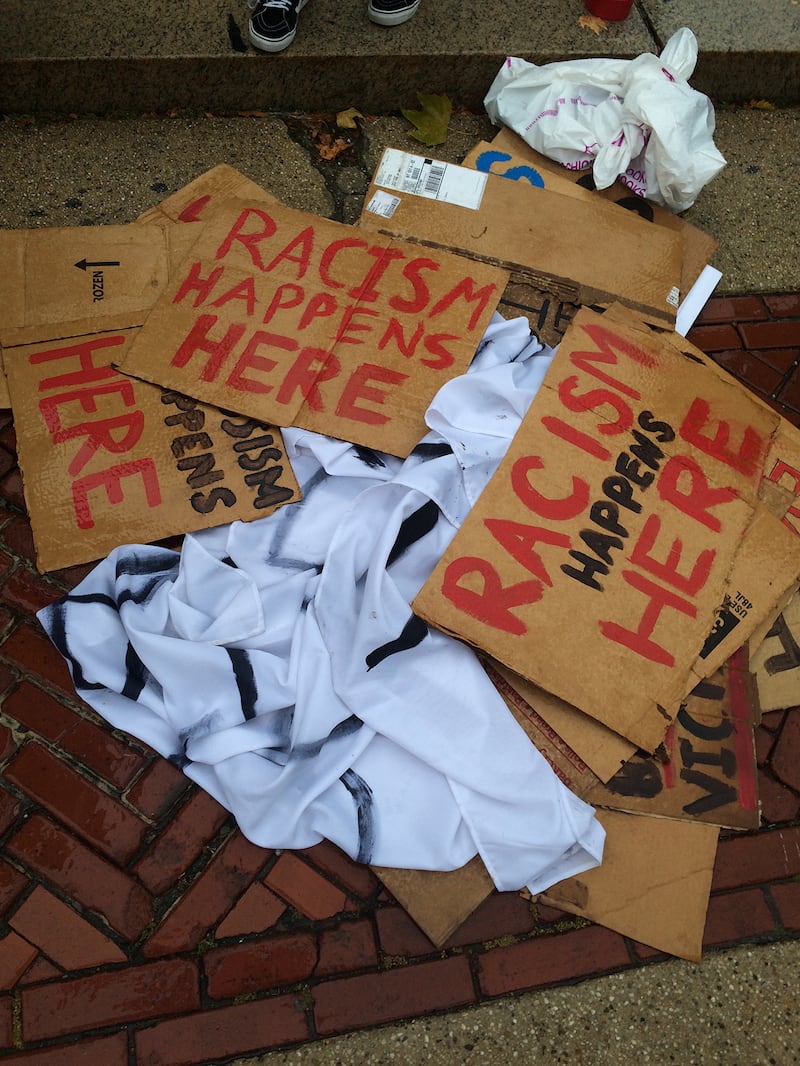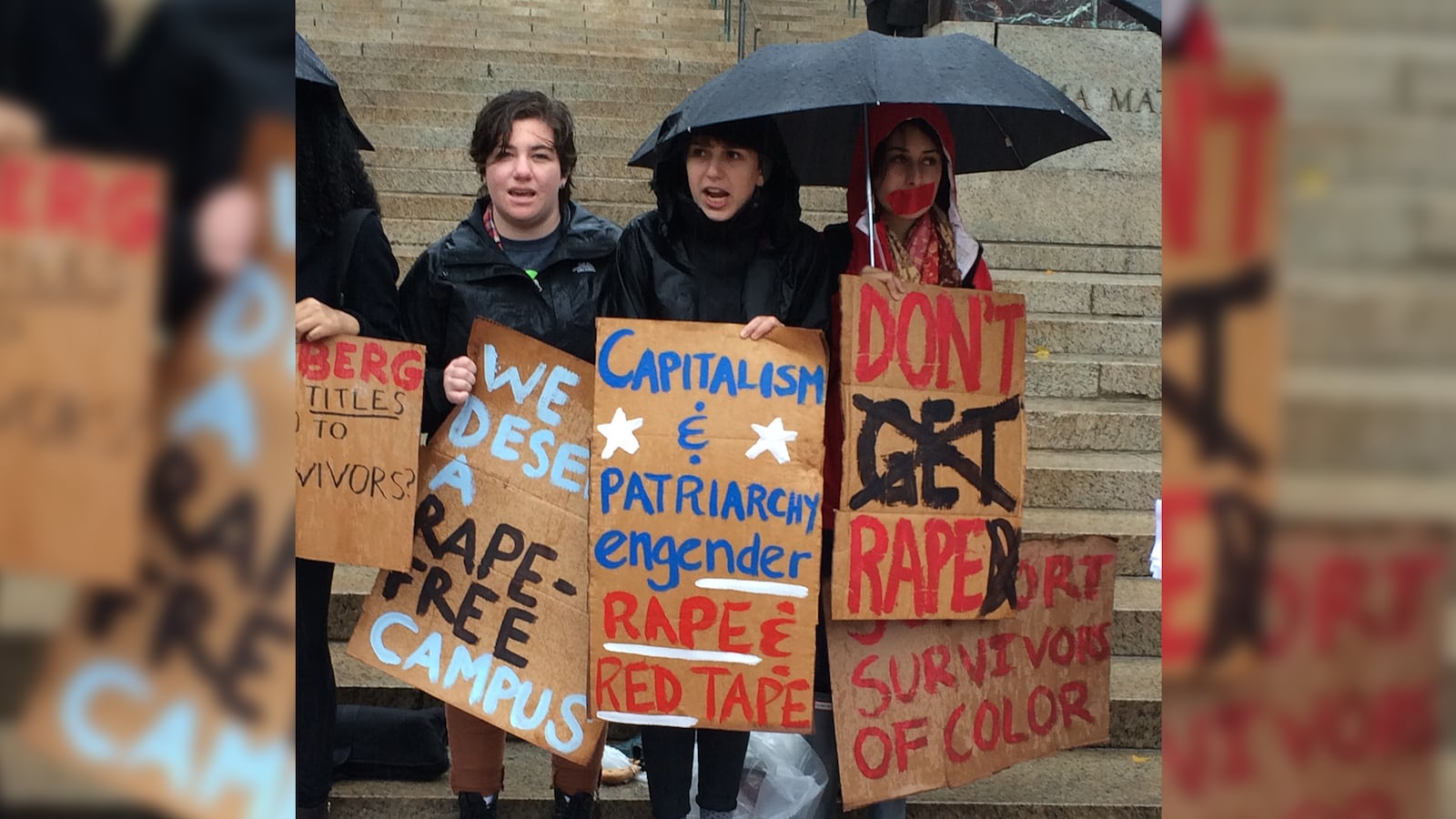“Racism? It happens here! Classism? It happens here! Oppression? It happens here! Protect all survivors!”

A dozen or so drenched Columbia students were chanting on the steps of Low Library early Wednesday afternoon, in a demonstration against seemingly every element of the university’s approach to combating sexual assault. On this rainy day, there were more soggy posters than spectators, and occasionally classmates would walk by and shout a cheer of support.
“Columbia Protects Rapists,” read one sign. “EVP [Executive Vice President for Student Life, Suzanne] Goldberg, How Many More Titles Do You Need to Support Rape Survivors?” admonished another. A third simply said, “Fuck Rape Culture.”
Other signs had more tangential messages:
“Racism Happens Here.”
“Capital & Patriarchy Engender Rape & Red Tape.”
“This Police State Must Stop.”
Anger over racism, classism, sexual and gender orientation-based discrimination, and—perhaps especially—over overpaid administrators all fell under the umbrella of Wednesday’s protests. Organized by No Red Tape, a campus group devoted to ending “sexual violence and rape culture and fighting for transformative, sustainable, survivor-centered solutions,” according to its Facebook page, the demands ranged from providing pay for peer counselors and cutting wait time to see sexual assault specialists, to training therapists to be sensitive to the history of U.S. slavery and the phrasing of student-life surveys.
Unfortunately in the flood of anger and disappointment at Columbia’s administration, it was sometimes hard to tease out what exact changes students wanted—which is a shame, because it is very clear that reform is needed when it comes to campus sexual assault.
One female student named Allie began a speech about Columbia’s problems by taking on the wording of a question on the Barnard Student Life Survey. It was a discussion that quickly went off the rails.
“In the Barnard Student Life Survey, one of the questions was, ‘How well do you think Barnard has handled campus sexual assault. There were only four options: ‘very sufficiently,’ ‘sufficiently,’ somewhat sufficiently,’ and ‘insufficiently.’ There was no ‘other’ box,” Allie stressed, her voice rising precipitously.
“The problem with those options is that, who’s answering?,” Allie said. “It doesn’t cater to people who have something to say. When the norm is being sexually assaulted, what does it mean ‘sufficiently?’”
Though the most recent major study on the issue says one in four women at college suffers sexual assault, and that number is clearly too high, that would not be considered the norm.
“If you are someone who has sexually assaulted an individual, wouldn’t you say the gross mishandling of sexual assault has been pretty sufficient for you?” Allie cried in an accusatory voice to feet stomping and finger snapping in approval.

“The problem is, we are an Ivy League campus. We’re supposed to be setting a precedent for other schools and society as well,” she said.
“In New York City, when a guy comes up and compresses you and pretends he is trying to get around you, and the guy behind you is also compressing you in between them and just groping you, then you’re left with nothing to do,” she said.
While the situation Allie described sounded highly unpleasant, it was not clear how the Columbia administration should be held responsible for groping on the New York City subways.
Race was another major concern during the protest. No Red Tape held Wednesday’s demonstration in conjunction with the Black Law Students Association, Empowering Women of Color, and other campus organization to “highlight the intersections between institutionalized discrimination and sexual assault at Columbia,” the press release stated.
Student protesters brought up concerns that racism influenced the perception of sexual assault perpetrators and were part of the larger problem that black men are disproportionately perceived as criminals and receive harsher sentences when prosecuted.
“All of the suspects are always black men,” Michela Weihl, a junior at Barnard and one of the main protest organizers, said during a speech addressing the campus alerts about potential rapists that students receive.
According to Weihl, students are not notified when attacks are perpetrated by a member of the Columbia University community, which plays into a historic fear of men of color.
“They feed into so many narratives of race, class, and gender. We hear a lot of narratives about safety, going back hundreds of years about what it means to protect pure white women from scary men of color. That kind of safety is not what we’re asking for,” Wiehl shouted, also to foot stomps of support.
When asked why Columbia only released alerts about sexual assault when alleged perpetrators were from outside the school community, Barbara Chen, the director of communications at Columbia’s Office of Student Life, pointed toward the official policy of protecting students’ identities: “Columbia adheres to both federal student privacy law and our ethical responsibility to never discuss individual students and their cases. (so that Columbia students, current and future, can confidently and confidentially seek extensive counseling and support services).”
Racism was also a concern in the treatment of sexual-assault victims. Brandy Walker, a second-year law student and member of No Red Tape, felt the university had responded inadequately to her sexual-assault complaint, at least partially because of her race.
“My race definitely played into how I was viewed,” Walker told me when we spoke one-on-one before the protest. She said she had been assaulted by a fellow African-American law student her first year at Columbia.
“As an African-American woman, studies show that there are stereotypes we’re hyper-sexual. What my assailant told [Columbia]—and what the university went with when it found him not guilty of sexual assault or harassment—was that I had propositioned him for oral sex. Despite the fact I said no and have a fiancé, the panel of fact-finders thought that was logical and reasonable because of my race.”
Walker said race was also a recurring problem in finding counselors who were sensitive to her specific needs as a black woman. But she didn’t think having more well-trained counselors of color was necessarily the answer, either. “We need counselors who are representative of the students who go there, but that’s not enough,” she said. “Just putting a black face in a position or a woman in a position doesn’t mean the patriarchy embraces us.”
Instead, Walker felt counselors, regardless of race, needed to be trained in the history of African-American enslavement to properly counsel sexual assault victims of color.
“You need people to understand the unique experiences of people of color, [to understand] the legacy of slavery in sexual violence against African-American women where rape went completely unprotected, where black women were seen as having no virtue,” she said.
I asked Walker if she had gone to the police in addition to the university. “I spoke to the police, but since my assailant didn’t get to actually rape me she [the police officer] closed her book because ‘his penis hadn’t been introduced,’” she said. I asked if she would share the details of her attack, and she explained the assailant “tried to convince me I had offered to give him oral sex after he tried to force himself on me.”
Even though this wasn’t a case of penetrative sexual assault, Walker hoped that that police would do more to investigate this incident. She was ultimately disenchanted. “I saw the way the criminal justice system ignores segments of survivors,” she said. “Because there weren’t blood and guts and a rape kit and all that, they weren’t even willing to take the case.”
Walker was hardly the only student who expressed disappointment with the police. Many of the protesters saw them more as an enemy and a drain on resources.
“We’re not asking for more police to come on this campus,” Weihl said during one of her speeches. “We’re not asking for more money to go to police to help survivors of sexual assault. We are asking for resources that will actually deliver justice and allow survivors to heal.”
Unfortunately, specific concerns about inefficient funding and allocation of resources was one of the serious issue that was sometimes buried amid rants about the student survey and powerful but vague protests against rape culture.
Alex, a representative from Columbia’s Student-Worker Solidarity group, clearly highlighted some of the current problems with funding. She spoke about how the students operating the Sexual Violence Response (SVR) services weren’t compensated at all.
“Everyone who works SVR is a really hard job. It’s completely unpaid, so when Columbia says they have 24/7 services, it’s completely unpaid student labor. That shows how little they care about people who experience sexual violence,” she said.
Chen could not find an administrator to specifically verify or deny this claim by the time of publication.
“This school doesn’t value student labor,” Alex said. “Even though administrators like Suzy Goldberg are paid so much money to do nothing, to fuck up students lives,” she said. Snaps and stomps from the protesters once again broke out.
Other students brought up that low-income victims were at a disadvantage because they could not afford private legal help. “You need parents who make hundreds of thousands of dollars a year for support when you’re assaulted at this university that we pay tens of thousands of dollars a year to go to,” Weihl said. “Low-income survivors should not be facing even worse situations because they don’t have thousands and thousands to shell out for good lawyers.”
Disturbing complaints about the dearth of available counselors and the long wait times were also sometimes lost in the students’ rhetoric.
Amelia, a freshman at Columbia who identified as a lesbian and a childhood sexual-assault survivor, spoke about how she had been raped twice within the first two months on campus, each time struggling to access adequate health services.
“There’s something wrong when the nurse I’m connected with chastises me for not being on birth control, even though I am a lesbian,” she said before the crowd. “There’s something wrong when medical services says there are no appointments so I can’t be tested for STI’s.”
Walker had similar complaints about the long wait times and lack of services through Columbia. She told me she reported her assault the day after it occurred. “I was given an appointment three weeks out. A friend had to give up her appointment for me. When I finally saw a counselor, she wasn’t trained in rape or sexual violence at all. When I asked for a psychiatrist, she said I’d need to wait three weeks. The following day, the psychiatrist I was supposed to see never showed up.”
One of the most oft-repeated complaints from the protesters was they felt it wasn’t even worth reporting their assaults to Columbia or police because the response would be so inadequate, and thus “re-traumatizing.”
“I never reported my rape, mainly because I had heard all the stories of the women who did,” stated one anonymous student, whose letter was read aloud during the protest. It came from a woman who identified herself as an international student from Africa.
“It’s scary to think that even in cases so publicized, particularly Ms. Sulkowicz's, the university did not take measures,” her letter stated. In fact, Sulkowicz did receive a response from Columbia. Her alleged rapist, Paul Nungesser, stood before a campus tribunal and was acquitted.
Based on the account in the anonymous letter, it is easy to see where this female student could have faced challenges in legal retribution:
“To this day, there are pieces of that night I do not remember what had happened… For the longest time, I denied the possibility [he raped me]. He was so charismatic and nice. I thought my nervousness and stress around him was because I liked him…. Months later, I kissed someone else and it triggered memories of that night.”
Still, it was both heartbreaking and infuriating to hear the conclusion of the letter, to learn of this student’s final decision not to report her alleged attack:
“I’m still struggling,” the student wrote. “Having no one to talk to and acknowledge it makes me feel like I am drowning. Reporting is not an option. Why put myself in that situation?”
Apparently, living in misery was better than attempting to seek help at Columbia—or so this student thought.






